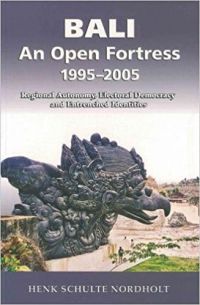Bali: An Open Fortress 1995-2005
- Title
- Bali: An Open Fortress 1995-2005
- Original language
- English
- Author(s)
- Illustrator(s)
- Publisher
- National University of Singapore Press
- ISBN
- 978-9971693756
- Publication date
- 2007
- Subjects
- Find Book
- Amazon
- Related Env. Initiatives
- Related Places
- Related Biographies
- Related Children's Books
- Related Holidays
- Related Folktales
- Related Comics
- Related Lontar
- Linked words
Description(s)
Long portrayed as a cultural safe haven, the Indonesian island of Bali is facing fundamental challenges as the political, religious and economic landscape changes. The book investigates the effects of decentralization and democratization on Balinese politics, and looks at the role played by urban intellectuals in reinforcing Balinese identity. Bali needs the outside world (tourists, capital, cheap labour) but the island’s people feel threatened by outside forces (powerful investors, Western decadence, Islam). Henk Schulte Nordholt characterizes it as an open fortress, accepting external influences while struggling to protect itself from them. In this book he investigates how Indonesia’s reformasi has affected caste relationships and is reshaping power relations at the provincial, district and village level. While his work highlights the role of criminal gangs and violent conflicts at the local level, he also considers the promised offered by local democracy.







Enable comment auto-refresher